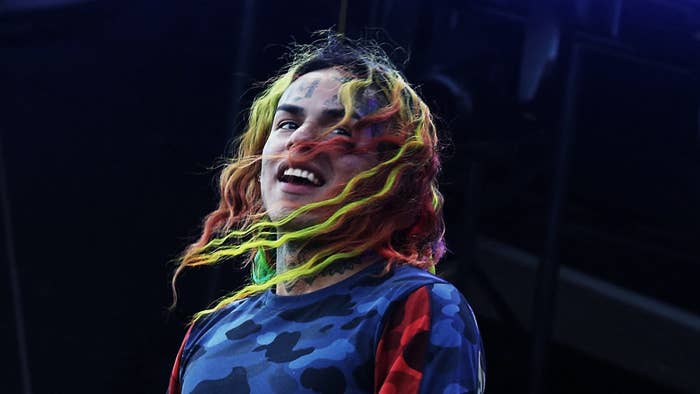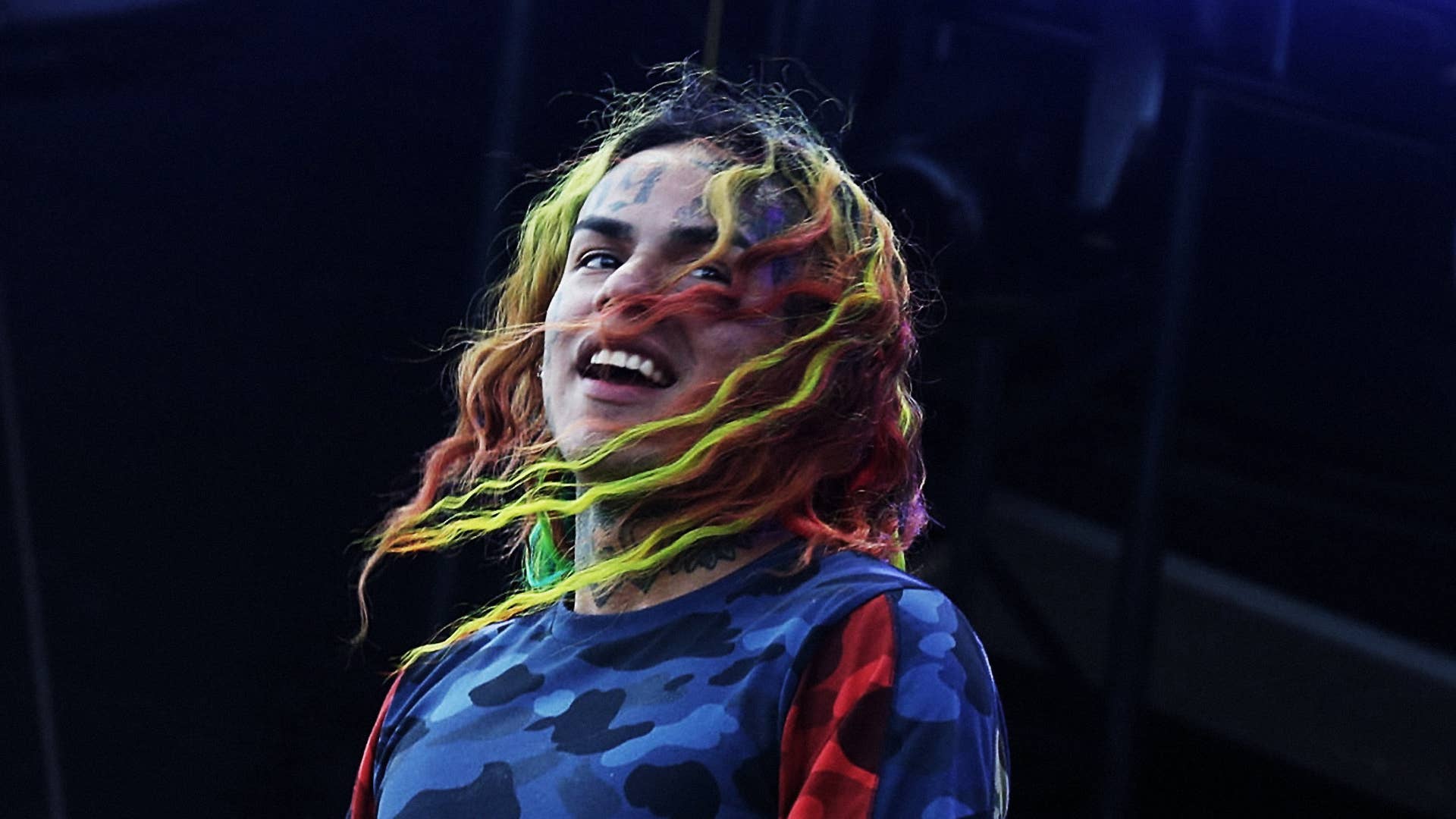
The coronavirus pandemic is spreading through the United States, and the world, at a shockingly rapid pace. And one of the places it’s hitting worst is the prison system. Inmates and correction officers across the country have already tested positive for the virus, and experts are describing the situation as a “ticking time bomb.”
With that in mind, many inmates are arguing that they should be released early. Among that number are several high-profile prisoners, including R. Kelly. The risk of illness in the pandemic has also made its way into the 6ix9ine case. Kintea “Kooda B” McKenzie, one of the defendants in the case, was recently granted release on bond until his sentencing in June, specifically because he was at “high risk” (due to his asthma) of contracting COVID-19 in Manhattan’s Metropolitan Correctional Center federal jail, where he has been housed since June 17, 2019.
And now, 6ix9ine himself looks almost certain to get out early as well. Here’s everything you need to know about that.
Is this an April Fools’ Day joke?
Despite the fact that this is going down on a day known for pranks, and that other outlets have joked about this news, this is most certainly not a joke. We’ve looked at court documents and talked to 6ix9ine’s attorney Lance Lazzaro directly. Also, this whole process began back on March 22. It just happens to be coming to the end of the line now.
Why is 6ix9ine eligible for early release?
With the Coronavirus wreaking havoc on the the prison system, some prisoners at high risk for the virus are being let out early. Among these are people with asthma, who are considered at a high risk of serious illness if they get sick.
6ix9ine has long had issues with asthma. The time he played dead in a hospital in 2017? He was there because of asthma. And he once did a skit with 50 Cent where he discussed his condition and was presented with an iced-out inhaler.
Will 6ix9ine be free?
Not exactly. If Judge Paul Engelmayer agrees to his legal team’s request, which at this point seems all but certain, 6ix9ine will be placed on home confinement until his release date. That date, originally in the Bureau of Prisons system as Sunday, August 2, is now “projected” to be the previous Friday, July 31, according to 6ix9ine’s attorney Lance Lazzaro.
How did this happen?
As the coronavirus crisis exploded, Lazzaro saw an opportunity to get his client out of prison and home early, because 6ix9ine had a long history of asthma and had already been hospitalized for bronchitis this past fall.
But the whole thing was a bit of a Kafkaesque nightmare, as bureaucracy after bureaucracy kept saying that the decision wasn’t up to them. The reason for the confusion? 6ix9ine’s status as a cooperating witness meant that he couldn’t be in a normal prison for security reasons. So he was placed in a private facility—a federal prison, but operated by a private company, not the Bureau of Prisons.
Everything started when, on March 22, Lazzaro asked Judge Engelmayer to allow 6ix9ine to serve out the remainder of his sentence on home confinement. In the letter to the court, obtained by Complex, the attorney wrote, “Mr. Hernandez has been complaining to prison officials this week of shortness of breath, but apparently the warden of his facility will not allow Mr. Hernandez to go to the hospital despite the recommendation of the facility’s medial [sic] director that Mr. Hernandez be treated by a doctor at a hospital.”
The government objected, saying that the decision should be in the hands of the Bureau of Prisons, not the judge. Lazzaro returned fire, pointing out that 6ix9ine was not technically a BOP prisoner, so they couldn’t let him out even if they wanted to.
On March 25, Judge Engelmayer sided with the government, but reluctantly. In the decision, obtained by Complex, he said that he “lacks the legal authority” to change 6ix9ine’s sentence. But he seemed sympathetic.
He wrote, “Had the Court known that sentencing Mr. Hernandez to serve the final four months of his term in a federal prison would have exposed him to a heightened health risk, the Court would have directed that these four months be served instead in home confinement.”
Lazzaro told Complex what happened next when we reached him on the phone Wednesday morning.
“The remedy at that point was to apply to the Bureau of Prisons, which I knew would more than likely deny him,” he explained. “But they had up to 30 days to issue that denial. I kept pushing them to make a decision immediately because, in today’s environment, with the virus spreading in a way that nobody could have imagined, it was imperative to get a quick decision. So the Bureau of Prisons through the general counsel this morning denied my request for compassionate release. That now becomes an appealable decision in front of Judge Engelmayer.”
On Wednesday morning, Engelmayer made his intentions very clear. He wrote a letter saying that the government has one last chance to argue that 6ix9ine should remain behind bars, and they have to make their case by 5 p.m. that day. But, he said, “provided that the Court has legal authority to grant the relief requested by defense counsel, the Court intends to do so”—in essence, unless the government knocks it out of the park, Engelmayer plans to let 6ix9ine serve out the rest of his sentence at home.
What happens now?
The government had until 5 p.m. Wednesday to make its case as to why 6ix9ine should stay locked up. Then the judge makes his decision—and, as you’ve seen, he has already strongly indicated which way he’s leaning. The government responded at a little bit before 2:15 p.m. Wednesday.
What did the government say?
They said that they wouldn’t stand in the way of 6ix9ine getting out. On Wednesday afternoon, U.S. Attorney Geoffrey Berman wrote, “[I]n the event the Court finds ‘extraordinary and compelling reasons’ presented by the defendant’s medical condition, placing him at high risk during the COVID-19 outbreak, the Government does not oppose the defendant’s motion for compassionate release.”
What does home confinement mean, anyway?
“Home confinement” is a broad term that can mean anything from staying in your house 24 hours a day to simply having a daily curfew. It seems likely that 6ix9ine will end up with what is sometimes called “home incarceration”—that is, 24-hour-a-day lockdown at his house except for medical necessities and legal activities. It also seems certain, given what has happened with other defendants in the case, that he will not be allowed to have contact with any of his co-defendants, or with any other gang members.
Has 6ix9ine caught the coronavirus?
Not that we know of. Lazzaro said that his star client has “had some shortness of breath” recently. And his asthma puts him in a high-risk group. As Lazzaro told Complex, “If he contracts the virus, he could die.” But there is no indication that he has caught COVID-19.
For more about 6ix9ine, listen to the Complex/Spotify podcast 'Infamous: The Tekashi 6ix9ine Story,' narrated by Angie Martinez.

